安徽省长丰县下塘实验中学八年级英语上册 Module 1 How to learn English
- 格式:doc
- 大小:149.51 KB
- 文档页数:8
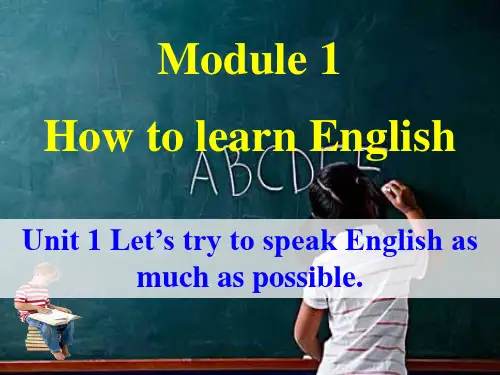
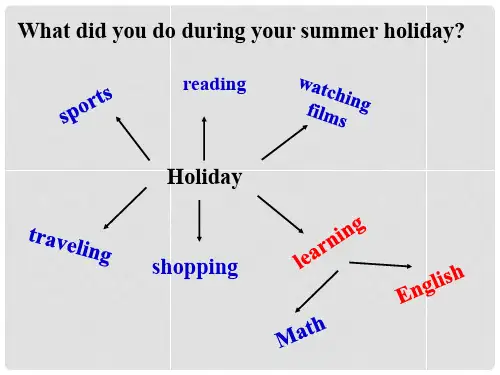
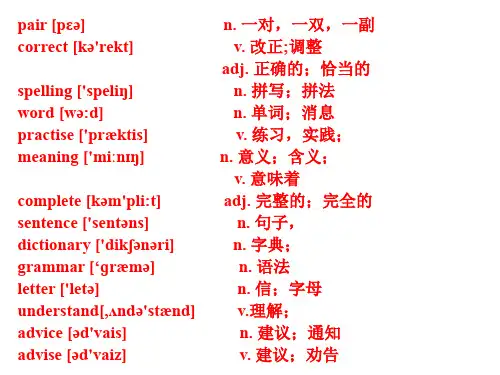
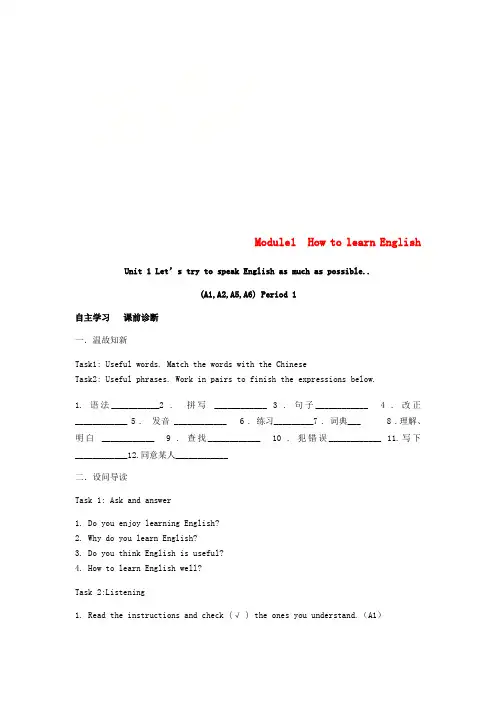
Module1 How to learn English Unit 1 Let’s try to speak English as much as possible..(A1,A2,A5,A6) Period 1自主学习课前诊断一.温故知新Task1: Useful words. Match the words with the ChineseTask2: Useful phrases. Work in pairs to finish the expressions below.1. 语法___________2 . 拼写____________ 3 . 句子____________ 4 . 改正____________ 5 . 发音 ____________ 6 . 练习_________7 . 词典___ 8 .理解、明白____________ 9 . 查找____________ 10 . 犯错误____________ 11.写下____________12.同意某人____________二.设问导读Task 1: Ask and answer1. Do you enjoy learning English?2. Why do you learn English?3. Do you think English is useful?4. How to learn English well?Task 2:Listening1. Read the instructions and check (√ ) the ones you understand.(A1)2.Listen and answer the questions. Usethe words and expressions in the box.(A2) Task3. Finish A5三.自学检测Talk about good ways to learn English.互动学习问题解决.用括号内单词的恰当形式填空。
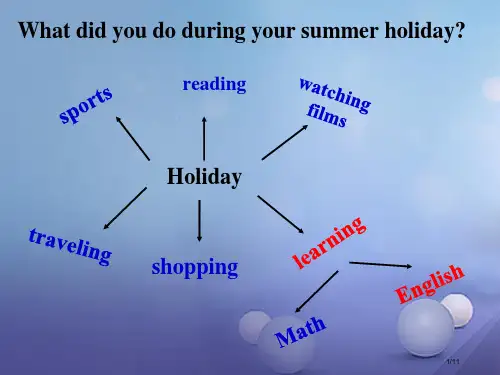
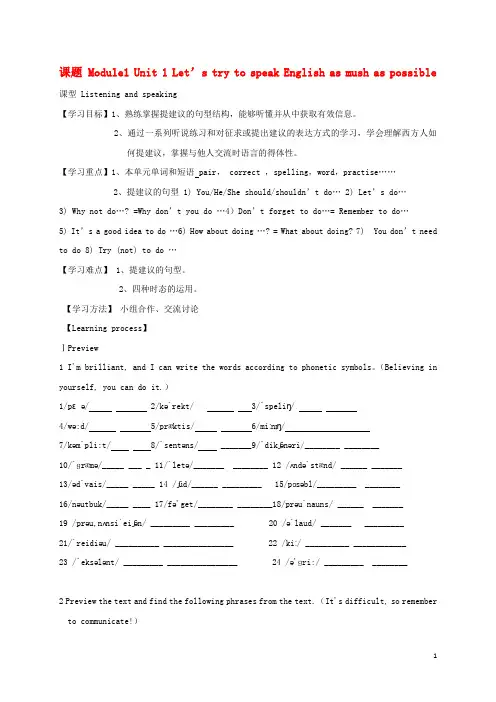
课题 Module1 Unit 1 Let’s try to speak English as mush as possible课型 Listening and speaking【学习目标】1、熟练掌握提建议的句型结构,能够听懂并从中获取有效信息。
2、通过一系列听说练习和对征求或提出建议的表达方式的学习,学会理解西方人如何提建议,掌握与他人交流时语言的得体性。
【学习重点】1、本单元单词和短语 pair, correct ,spelling,word,practise……2、提建议的句型1) You/He/She should/shouldn’t do… 2) Let’s do…3) Why not do…? =Why don’t you do …4)Don’t forget to do…= Remember to do…5) It’s a good idea to do …6) How about doing …? = What about doing?7) You don’t needto do 8) Try (not) to do …【学习难点】 1、提建议的句型。
2、四种时态的运用。
【学习方法】小组合作、交流讨论【Learning process】ⅠPreview1 I'm brilliant, and I can write the words according to phonetic symbols。
(Believing inyourself, you can do it.)1/pεə/ 2/kə`rekt/ 3/`speliŋ/4/wə:d/ 5/præktis/6/miːnɪŋ/7/kəm`pli:t/ 8/`sentəns/ _______9/`dikʃənəri/________ ________10/`ɡræmə/_____ ___ _ 11/`letə/_______ ________ 12 /ʌndə`stænd/ ______ _______13/əd`vais/_____ _____ 14 /ʃud/______ _________ 15/pɔsəbl/_________ ________16/nəutbuk/_____ ____ 17/fə'get/________ ________18/prəu`nauns/ ______ _______19 /prəu,nʌnsi`eiʃən/ _________ _________ 20 /ə`laud/ _______ _________ 21/`reidiəu/ __________ ________________ 22 /kiː/ __________ ____________23 /`eksələnt/ _________ ________________ 24 /ə'ɡri:/ _________ ________2 Preview the text and find the following phrases from the text.(It's difficult, so rememberto communicate!)1.谈论______________2.尽可能多_______________3.写下我们的错误_______________4,旁边__________________________5,还有什么_______________________6,拼写以及发…音__________________7,非常感谢_______________8. ……怎么样?__________________9,那对….有好处_________________10,对……来说也一样_______________11,尽量,尝试____________________12,同意__________________ⅡCooperative learning【Pre-listening】Read the instructions and check the ones you understand. (Activity1)【While-listening】1 Listen and answer the questions. Use the words and expressions in the box. (Activity2)2 Listen the dialogue and write notes about learning English. (Activity3)【Post-listening】1 Group exercise. Read the dialogue in groups and underline the correct words and expressions. (Activity4)【Summary】I study, and I summarize. Find express the suggested sentences. (It's difficult, so remember to communicate!)3 Pronunciation and speaking(1) Listen to the tape, imitate the intonation, and then correct the pronunciation in the group. (Activity5)(2) Can you add a single word after each set of words ?________________________________________________________________【Classroom consolidation】(1) Work in pairs. Talk about problems in learning English and give advice. (Activity6)(2) Complete the word according to the sentence meaning and initial letters or Chinese.1. That sentence is so long that we can’t u________ it.2. His uncle gave us some a________ on how to learn English well.3. I think it is p________ for us to travel to the moon in the future.4. He can play the piano well, because he p________ playing it every day.5. My teacher asked me to c________ the mistakes in my homework.6. Mr Brown bought three ________(词典) from the bookstore yesterday.7. Mike often teaches me to ________(发……的音) English words.8. How many ________(字母) are there in the long word?9. Tony ________(忘记) to do his homework last night.10. Some boy students often make ________(拼写) mistakes.【Homework】(1). Fill in the blanks with proper prepositions according to the context, so that thecontext is complete.1. Mr Smith asked us to match the words ________ their meanings.2. The students are working ________ pairs to answer the questions.3. Why is it difficult ________ Mike to learn maths well?4. Listen! They are talking ________ good ways to learn English.5. David often writes down what he reads ________ his notebook.6. Jack knows a lot ________ the world through reading.7. My cousin writes ________ his pen friend in England once a week.8. Listening to the radio is good ________ our pronunciation.(2). Complete the English sentence according to the Chinese meaning.1. 他不知道那个单词的意思,因此他查了词典。
1 Module 1 How to learn English Unit2 You should smile at her教案 一、学习目标: A.单词和短语: pair, correct, spelling, word, practice, match, meaning, complete, sentence, dictionary, grammar, letter, look up, mistake, make a mistake, understand-understood, advice, should, possible, write down, notebook, forget-forgot, pronounce, aloud, radio, key, main, excellent, agree, agree with sb., vocabulary, ask for, improve, basic, time, advise, shy, conversation, quickly, natural, suggest, place B.交际用语: 1. Ready? 2. That’s a good idea. 3. What else? 4. Thanks a lot! 5. Excellent! 6. We should always speak English in class. 7. Let’s try to speak English as much as possible. 8. Why not write down the mistakes in our notebooks? 9. It’s a good idea to spell and pronounce new words aloud. 10. How about listening to the radio? 11 It’s better not to translate. 12.It’s a good idea to check new words every day. 二. 教学目标 1. Function : Giving suggestions (English study) 2. Structure: Giving advice: 1) We/You should… 2) Let’s try to… 3) Why not…? 4) It’s a good idea to… 2
5) How about…? 6) Why don’t we/you…? 7) It’s better not to… 3. Skills: 1) Listening and understanding familiar topics (English study). 2) Talking about problems in English study and giving advice, conducting conversations in several turns. 3) Reading and finding specific information about English study. 4) Drafting a letter asking for advice about English study, revising through pair discussion. 4. Around the world: English online 5. Task: Writing your English study plan. 三、重点及难点: Giving advice: 1) We/You should…2) Let’s try to…3) Why not…? 4) It’s a good idea to…5) How about…? 6) Why don’t we/you…? 7) It’s better not to… 四、教学设计: Unit 2 You should smile at her! ⅠTeaching model Reading and writing. ⅡTeaching method Top-down approach ⅢTeaching aims 1. Listening and understanding familiar topics (English study). 2. Talking about problems in English study and giving advice, conducting conversations in several turns. 3. Reading and finding specific information about English study. 4. Drafting a letter asking for advice about English study, revising through pair discussion. ⅣTeaching Objectives Key vocabulary: ask for, improve, basic, advise, shy, conversation, quickly, natural, suggest 3
ⅤTeaching aids Recorder, OHP, video ⅥTeaching Steps Step 1 Warming-up 1. Free talking: How to learn English well? 1) We should always speak English in class. 2) Let’s try to speak English as much as possible. 3) Why not write down the mistakes in our notebooks? 4) Don’t forget to write down the correct answers next to the mistakes. 5) It’s a good idea to spell and pronounce new words aloud every day. 6) How about listening to the radio? 7) How about reading English stories? 8) Why don’t we try to find some English pen friends? 2. Review the text of Unit 1. Step 2 Work in pairs. Talk about problems you have with… 1. understanding English 2. speaking English 3. learning vocabulary Step 3 Learn new words. 1. Show some pictures. 2. Talk something about the pictures. 3. Introduce the new words. 4. Read the words after the teacher. Step 4 Reading. 1.Tell the students: There are three basic questions. The first question is about understanding English films and songs. The second question is about speaking. The third question is about vocabulary. 2. Play the recording and listen to the tape carefully. 3. Ask the students to read through the passage. 4
4. Read the passage and complete the table. Advice from Diana Li Hao Wang Fan Zhang Lei 4. Check with a partner. 5. Call back the answers from the whole class. Keys: 1. Watching films and listening to songs are great ways to learn English! Watch and listen several times, and guess the meaning of the new word. Each time you will learn something new. Talk about the films or songs with your friends. 2. You can say: “Hello! How are you? Do you like China?” These are good ways to start a conversation. And before you begin, you should smile at her! Don’t be shy. 3. Write four or five words a day on pieces of paper and place them in your room. Read the words when you see them, and try to use them. 6. Read the text together. 7. Learning to learn. List all the things you are good at in learning English. Try to use what you are good at to help you learn what you are not good at. Step 5 Complete the passage. 1. Ask the students to the words in the box in Activity 4. advise basic conversation improve meaning shy suggest 2. Ask the students to read through the passage in Activity 4. Diana, the Language Doctor, gives some (1) ___________ advice about learning English. She (2) ___________ you to talk about films and songs, and the (3) _________ of new words. The second piece of advice is this: Start your (4) _________ greetings or a question. She (5) ____________ that you smile before you speak and do not feel (6) ___________. Finally, (7) ____________ your vocabulary with four to five new